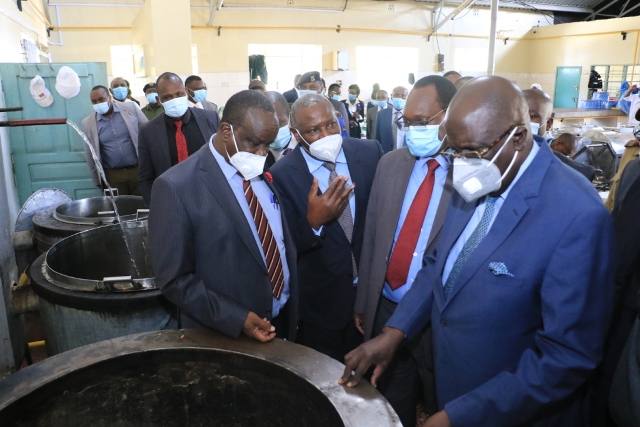Share this
Equity has launched an initiative to support learning institutions to transition from wood-fuel based cooking to cleaner, sustainable, and environmental sources of cooking and lighting.
Dubbed the ‘Clean Cooking Project’, the initiative aims at supporting learning institutions to install modern technologies for cooking that are environmentally safe such as steam-based cooking, biofuels, sustainable biomass and Liquid Petroleum Gas (LPG). Equity will provide financing for the equipment and other installation costs based on an institution’s needs.
Speaking during the launch of the initiative at Alliance High School, Equity Group Managing Director and CEO, Dr. James Mwangi said, “Wood-fuel is not a sustainable model for our planet as it has led to adverse environmental degradation and depletion of our much-needed forest cover. Lack of appropriate financing and innovative technologies has been the biggest barrier to clean energy transition. To close this gap, we have decided to partner with learning institutions to facilitate them access and install more environmentally friendly cooking and lighting facilities”.
According to the Clean Cooking Alliance of Kenya (CCAK) study on ‘Use of Biomass Cookstoves and Fuels in institutions in Kenya report of 2018’, 97% of primary and secondary schools use firewood derived from forests as cooking fuel. This counters the Kenya government efforts of attaining the constitutional requirement of 10 percent forest cover.
“We decided to create a more integrated programme to ensure trees would grow to maturity and not be used as an energy source. For us to migrate from wood-based fuel solutions in our institutions, we require a concerted effort from the management of the various institutions, energy technology providers, end-users and government agencies. We encourage institutions and organizations to take this route and lead the way so that we can protect our environment. Equity will walk with you on this journey,” added Dr. Mwangi.
CCAK estimates that 1 million metric tonnes of wood-fuel is used by primary and secondary schools every year with a value of KES 10 billion. The increased over-reliance on wood and charcoal as the primary sources of fuel by institutions requires urgent attention for Kenya to reduce greenhouse gas emissions by 30% by the year 2030 under the Intended Nationally Determined Contribution (INDC).
Education Cabinet Secretary Prof. George Magoha, who presided over the launch, said, “Alliance High School has traditionally used wood for cooking, harvested from trees in its compound. With the installation of clean cooking infrastructure, the school can now reap the benefits of cleaner and environmentally friendly cooking solutions. This is a project that is transformative and in line with the Government’s agenda. When you look at the negative effects of climate change you will understand its importance. My call today is for all schools in Kenya to quickly follow suit and embrace clean energy solutions. This will contribute in reversing environmental degradation, save costs and improve health outcomes. If all schools switched to cleaner alternatives, we will not only preserve our trees but will also significantly reduce our carbon footprint.”
By transitioning to cleaner fuels like LPG, institutions can realize up to 40% savings in their cooking and lighting budget with better health and environmental outcomes, improved kitchen hygiene and motivation of workers.
“I am very grateful to Alliance High School, Equity and its technical partners for making it possible to have Alliance transition from a heavy consumer of wood fuel to modern and cleaner cooking technology that preserves the environment. The school’s kitchen will be used as a model for all institutions that want to adopt this technology,” added Prof. Magoha.
Equity is fully committed to working with all learning institutions in Kenya for them to realize the multiple benefits of modern and clean energy.
Last year, Equity committed to planting 35 million trees to contribute and rally the country towards the achievement of 10% forest cover. Out of the 35 million trees, Equity intends to plant 20 million in learning institutions. So far, Equity has planted 3.2 million trees, 2 million of which has been planted in 2,133 schools across the country. This is in support of the government initiative to achieve the 10% forest cover. Kenya Forest Service (KFS) and the Ministry of Environment & Forestry are supporting Equity through technical assistance on seedlings requirements for different geo-ecological zones, adoption of forest blocks that require rehabilitation and other logistical support.
Equity through the Foundation is promoting and driving conservation and smart use of natural resources by expanding forest cover, improving water security and promoting the use of renewable energy and energy-efficient technologies. So far 780,000 households and businesses have been supported to access clean energy products including solar panels for lighting and heating in homes, schools and hotels.





